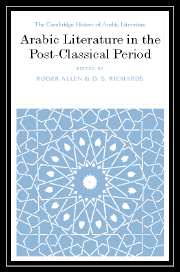Book contents
- Frontmatter
- The post-classical period: parameters and preliminaries
- Part I Elite Poetry
- 1 Arabic poetry in the post-classical age
- 2 Poetic creativity in the sixteenth to eighteenth centuries
- 3 Arabic religious poetry, 1200–1800
- 4 The role of the pre-modern: the generic characteristics of the band
- Part II Elite prose
- Part III Popular poetry
- Part IV Popular prose
- Part V Drama
- Part VI Criticism
- Bibliography
- Index
- References
2 - Poetic creativity in the sixteenth to eighteenth centuries
from Part I - Elite Poetry
Published online by Cambridge University Press: 28 March 2008
- Frontmatter
- The post-classical period: parameters and preliminaries
- Part I Elite Poetry
- 1 Arabic poetry in the post-classical age
- 2 Poetic creativity in the sixteenth to eighteenth centuries
- 3 Arabic religious poetry, 1200–1800
- 4 The role of the pre-modern: the generic characteristics of the band
- Part II Elite prose
- Part III Popular poetry
- Part IV Popular prose
- Part V Drama
- Part VI Criticism
- Bibliography
- Index
- References
Summary
introduction
Studies in Arabic devoted to poetic output during the period between the fifteenth and eighteenth centuries are characterized by a kind of anxiety caused by a painful awareness that Arabic poetry at the time had entered its era of decline and was facing a serious crisis. There is also some sort of consensus that the creative impulse motivating Arabic culture had begun to flag, to break down and indeed to disappear. Thence the concept of ‘period of decadence’ derived its influence and overriding ability both to colour the vision of all those who deal with the topic and to define the approach of scholars who make use of the term.
If one looks at works on the poetry of this period, one soon notices that, because the entire era is shrouded in obscurity, the methods and conclusions of those who have studied it consist of judgements regarding contents and their documentary dimension. However, the application of this simplifying instinct to research on this period does not result from a lack of familiarity with the poetry produced. The real reason is the serious conflict between desire and history that arises at the moment of reading: between what actually happened on the one hand - in other words, the dilemmas and ruptures that Arabic poetry found itself facing - and, on the other, what the researcher would like to have happened. For this very reason the opinions and attitudes adopted are founded on a system that of necessity leads either to an exaltation of the poetry of the period - extolling it to the very skies and considering it as a further developmental link in the course of Arabic poetic creativity through the ages - or else to a process of contempt - whereby it is trivialized and discarded, being viewed as mere artifice that has managed to sweep aside the artistic achievements of Arabic poetry Research on the history of Arabic culture and the period of‘decadence’ is full of a curious kind of keening ritual; the portrait is dark and distressing, at the cusp of a decline.
- Type
- Chapter
- Information
- Arabic Literature in the Post-Classical Period , pp. 60 - 73Publisher: Cambridge University PressPrint publication year: 2006



